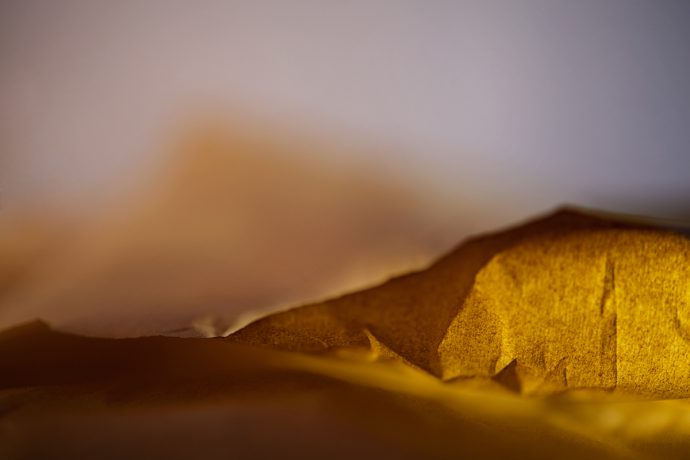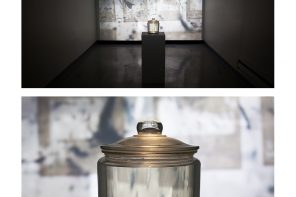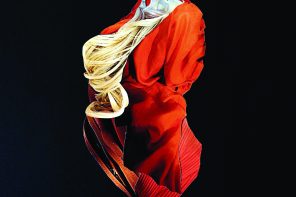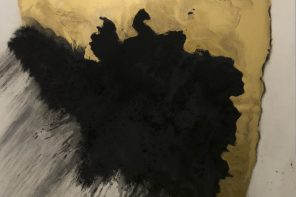Ten Remarkable Interpretations
1
I’m not too old to dance meadowlarks: great punctuation
locks in black and blocks, crepuscular and vain the sun
in its descent. “You kicked up dust”
of which the Ural mountains are but dim reminders
through a wooded alley loud as if disturbed
in the unbuttoned fog that grays a pedestrian’s silhouette
while the passport picture reaching out to me is true or false
to tetrahedral nation-states dead in winter water, enzyme ice.
I cannot fear to be forgotten
a child born another book the dust at dusk
of skilled sculptors whose cities sink
the swollen toad, her pride
flamingoes, lilies, and boy flowers
the center of a blue-black vault, history on it, an apron.
2
Language is a victim of its own success
while into the carriage comes a louder lyric me
of which the Cockscomb Mountains are like apples rotting in the dust
that none of us would be content with
and a caterpillar’s cud to chew
poor tucks can kill, pour tanks, and call.
People are forced to live, work, yearn with bourgeois linearity
to change this nerdy life upon row upon row upon row
of the river pulled further and further apart
under the unswallowed elegy of a collared stork.
Then productivity as reproductivity ends. Motion
gets immobilized by perception into things perceptions get
but perception gets it wrong
is language. Let’s use it.
3
Doing is highly thought of and frequently abandoned
as at a bus stop beside a stunted gingko, and time is tossed
a laundry pile large as the crown of a tree
or the gravid animal of Pythagoras, and every mathematician dies
while runnels vacillate or do nothing astrophysically speaking.
Let’s go for eggs and to the bakery.
My kid wants to be a puppeteer.
But someone must polish glass and since then the refugees weep wax
and travel over agate pastures and gag.
But we have to trust philosophy—and deny the property
where depiction most perfectly depiction depicts.
In a faux chateau of finance the proposition is a picture
of corn cakes, last crumbs, weapons passing from hand to hand.
Let’s rest. Life is fast. As the city rat, resuming, says: “Rudeness is rude.”
4
It can be argued from horseback—the horse a ruby roan
as night falls on the shores
before an infant knows of time—
that there is something in mathematics
shorn of ideology. I propose too that there are many things
with their capacity to collide or combine with other things
in the vicinity (that gravitational field of monsters)—
and budding dust small flies: they totter.
The public does not need to be convinced.
An idiom like Kierkegaard on Halloween
gathering twigs and fathering eggs while a stunted thorn
frolics in the shade now dead
inconsistently down the large white sea
does what a poem does, making itself understood.
5
Every situation can be taken as subject to a proposition
at stake at this stage of the state. Rejection of a context
need not be of one’s own hoeing
of the sun, one’s head a building site. Say I rode in on a vicious mule
surrounded by leaves under the northern star, the eternal conflict.
Say I beat my brow and only put on shows, withered
webs, a rigmarole, an atrocity to which I’ll give no words. I refuse it
representation. The janitor is innocent, autumn is ill, and cruelty
is the rule. I swear you’ll be my father until I die
from a flea bite or while beating a metal drum, eating honey and corn
like a girl again with an umbrella under a redwood tree
with all of which I am in a certain sense one. The roof
on trust of hover can’t render love pathetic. I claim too much
and yield to the Bighorn Mountains of which the truth of history is but an indifferent silence.
6
Because we refuse to personify the gaping east or deformed west
or cranial north or sacrificial south we must accept this box
and these panoramas to which we were led through sliding doors
just as certain Alpine cliffs reproduce the “head” variants of Mayan “script”
with an impersonal cluck to the jeweler.
Wherever a human is to be found, there you will find
occupation, a skyscraper, a 9-foot copper weathervane, imperial pickles
a force plundering an unarmed ceramic bowl.
Urban greenbelts lift a feisty allegorical vegetation in human voice
above an opium fish, a dime in cinders under the wind
and there are wealthy men, skin not yet charred. They are popular
as hardware, music, poached eggs, modesty, multicolored snapdragons
and the alphabet sacrificed in times of need. I live under the authority
of a stucco beehive and a soldier says affectionately to me, You there!
7
We think, we approach, we exist
sweep and speak, on ziplines or not.
Sayings spread as amusements for children women and men
by pony-poets, beetle-poets, crow-poets
are voiced by the words themselves and not by anyone speaking them.
I dab fingernail polish on six croquet balls.
Which of the names of Hercules do you hear and in which of your ways
of which the hill behind the soldier bathed in sweat is like a general’s nose
or the yellow bowl upturned beside the kitchen sink after I wash it to dry.
It’s now a wedding finch a reference to whistling rain
a great honesty in the far sacerdotal south.
Do they piss on the spider,
the aged face of the great organizer on slender evidence,
the rising sun that hangs a puppet from my hands?
8
The mountaineer rappels at midnight the wall a wall
a wall a woman recalls: a contingent object—it might never have existed
then you look at your fists and there are the letters o
in admonition, odor, foot. A dog shakes premonitions from its coat
lovers of time—time of all kinds—
winged insects, mosquitoes mostly but also moths.
Welcome, unwelcome, buffeted? Who can make durable wax?
Who can knot? The baker is a man and brutalizes wheat
and all attempts recall a textual residue of celebrating rats
a game of backgammon with dancing kissing getting drunk
hugging singing crying when we were leaving war
a stumbling block reconstructed and constructed
o xank history thistle e tspung hatchet
corvid head over human heels, facing a direction wrong or right.
9
Pity combatants on the line who self-concretize, becoming paving stones
but I say too loudly that of which I don’t know how to say enough
borrowing transcription from a local pebble held in a palm
from which a puppet tugs as if pulled by the revolutions of the planets
Mercury Saturn or Mars over nearly twelve and a half million days
marking time, which is the subject matter of history
in which the sun itself bakes the bread then drawn from the oven
and cooling under the proprietary nakedness of the caustic trees.
So, asked a bee of experience, “How is it that umbrellas are raised
against the future of the sun?” Remnants of the past
don’t expect us, remnants of the past didn’t foretell us.
Our songs are sonically shattered over shortwave by a scop
singing the praises of his patron, the racist acquitted—he nods
and flees the derelict pattern.
10
People work under the clouds and are direct
inheritors of the things that happen every twenty days.
What saddle do we use? A wolf has been caught
and it sweats. My own sleeps do not unfold in easy procession
which is called lustrous, erect, major, and will in some field cease
altogether. Then tell me what you have to say.
The chains obey, the dogs piss under glass, voracious
fish leap from the beams, we do arbitrary things—appear
and disappear as leonine as dogs. The first person
is made for oneself, denizen of a cult or rubbish heap
ready for the evening show in the cavern of centuries. The second
is made for you, a respectable human of greenish hue.
We had a drink and it cost a house
into which we moved, music coming from stone.
Lyn Hejinian is the author of numerous books, the most recent of which is The Unfollowing. She teaches at the University of California, Berkeley, where her academic work is addressed principally to modernist, postmodern, and contemporary poetry and poetics, with a particular interest in avant-garde movements and the social practices they entail.




